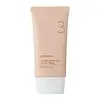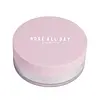Numbuzin No.3 Porcelain Base-Skip Tone Up SPF 50+ Versus Rose All Day The Realest Lightweight Loose Powder
What's inside
What's inside
 Key Ingredients
Key Ingredients

 Benefits
Benefits

 Concerns
Concerns

 Ingredients Side-by-side
Ingredients Side-by-side

Water
Skin ConditioningZinc Oxide
Cosmetic ColorantCyclohexasiloxane
EmollientPropanediol
SolventPropylheptyl Caprylate
EmollientCaprylyl Methicone
Skin ConditioningTrimethylsiloxysilicate
EmollientPolyglyceryl-3 Polydimethylsiloxyethyl Dimethicone
Skin ConditioningTitanium Dioxide
Cosmetic ColorantNiacinamide
SmoothingDisiloxane
Skin ConditioningButyloctyl Salicylate
Skin ConditioningCentella Asiatica Extract
CleansingPolygonum Cuspidatum Root Extract
AntioxidantScutellaria Baicalensis Root Extract
AstringentCamellia Sinensis Leaf Extract
AntimicrobialRosmarinus Officinalis Leaf Extract
AntimicrobialChamomilla Recutita Flower Extract
MaskingArtemisia Capillaris Extract
Glycyrrhiza Glabra Root Extract
BleachingHouttuynia Cordata Extract
Skin ConditioningMelaleuca Alternifolia Leaf Extract
PerfumingRosmarinus Officinalis Leaf Oil
MaskingDisteardimonium Hectorite
StabilisingMagnesium Sulfate
Triethoxycaprylylsilane
1,2-Hexanediol
Skin ConditioningPolyglyceryl-2 Dipolyhydroxystearate
Skin ConditioningLauryl Polyglyceryl-3 Polydimethylsiloxyethyl Dimethicone
Skin ConditioningMethyl Methacrylate Crosspolymer
Polymethylsilsesquioxane
Dicaprylyl Carbonate
EmollientGlyceryl Caprylate
EmollientCaprylyl Glycol
EmollientMica
Cosmetic ColorantAluminum Hydroxide
EmollientEthylhexylglycerin
Skin ConditioningPerfluorooctyl Triethoxysilane
Tocopherol
AntioxidantButylene Glycol
HumectantPentylene Glycol
Skin ConditioningCI 77492
Cosmetic ColorantCI 77491
Cosmetic ColorantCI 77499
Cosmetic ColorantWater, Zinc Oxide, Cyclohexasiloxane, Propanediol, Propylheptyl Caprylate, Caprylyl Methicone, Trimethylsiloxysilicate, Polyglyceryl-3 Polydimethylsiloxyethyl Dimethicone, Titanium Dioxide, Niacinamide, Disiloxane, Butyloctyl Salicylate, Centella Asiatica Extract, Polygonum Cuspidatum Root Extract, Scutellaria Baicalensis Root Extract, Camellia Sinensis Leaf Extract, Rosmarinus Officinalis Leaf Extract, Chamomilla Recutita Flower Extract, Artemisia Capillaris Extract, Glycyrrhiza Glabra Root Extract, Houttuynia Cordata Extract, Melaleuca Alternifolia Leaf Extract, Rosmarinus Officinalis Leaf Oil, Disteardimonium Hectorite, Magnesium Sulfate, Triethoxycaprylylsilane, 1,2-Hexanediol, Polyglyceryl-2 Dipolyhydroxystearate, Lauryl Polyglyceryl-3 Polydimethylsiloxyethyl Dimethicone, Methyl Methacrylate Crosspolymer, Polymethylsilsesquioxane, Dicaprylyl Carbonate, Glyceryl Caprylate, Caprylyl Glycol, Mica, Aluminum Hydroxide, Ethylhexylglycerin, Perfluorooctyl Triethoxysilane, Tocopherol, Butylene Glycol, Pentylene Glycol, CI 77492, CI 77491, CI 77499
Talc
AbrasiveMica
Cosmetic ColorantAluminum Starch Octenylsuccinate
AbsorbentNylon-12
Silica
AbrasiveCaprylyl Methicone
Skin ConditioningSynthetic Fluorphlogopite
Dimethicone/Vinyl Dimethicone Crosspolymer
Skin ConditioningBoron Nitride
AbsorbentDimethicone
EmollientMethyl Methacrylate Crosspolymer
Hydrogen Dimethicone
Glycerin
HumectantLycopodium Clavatum Extract
Skin ConditioningPhenoxyethanol
PreservativeIsopropyl Titanium Triisostearate
EmollientImperata Cylindrica Root Extract
Skin ConditioningTocopheryl Acetate
AntioxidantTriethoxycaprylylsilane
Aluminum Hydroxide
EmollientPentylene Glycol
Skin ConditioningRosa Damascena Flower Oil
MaskingRosa Damascena Flower Water
MaskingCI 77891
Cosmetic ColorantCI 77491
Cosmetic ColorantCI 77492
Cosmetic ColorantCI 77499
Cosmetic ColorantTalc, Mica, Aluminum Starch Octenylsuccinate, Nylon-12, Silica, Caprylyl Methicone, Synthetic Fluorphlogopite, Dimethicone/Vinyl Dimethicone Crosspolymer, Boron Nitride, Dimethicone, Methyl Methacrylate Crosspolymer, Hydrogen Dimethicone, Glycerin, Lycopodium Clavatum Extract, Phenoxyethanol, Isopropyl Titanium Triisostearate, Imperata Cylindrica Root Extract, Tocopheryl Acetate, Triethoxycaprylylsilane, Aluminum Hydroxide, Pentylene Glycol, Rosa Damascena Flower Oil, Rosa Damascena Flower Water, CI 77891, CI 77491, CI 77492, CI 77499
 Reviews
Reviews

Ingredients Explained
These ingredients are found in both products.
Ingredients higher up in an ingredient list are typically present in a larger amount.
Aluminum Hydroxide is a form of aluminum. It can be naturally found in nature as the mineral gibbsite. In cosmetics, Aluminum Hydroxide is used as a colorant, pH adjuster, and absorbent.
As a colorant, Aluminum Hydroxide may add opacity, or reduce the transparency. Aluminum hydroxide is contains both basic and acidic properties.
According to manufacturers, this ingredient is an emollient and humectant. This means it helps hydrate the skin.
In medicine, this ingredient is used to help relieve heartburn and help heal ulcers.
There is currently no credible scientific evidence linking aluminum hydroxide in cosmetics to increased cancer risk.
Major health organizations allow the use of aluminum hydroxide in personal care products and have not flagged it as a carcinogenic risk at typical usage levels.
Learn more about Aluminum HydroxideCaprylyl Methicone is a type of silicone.
It helps soften and soothe the skin by creating a thin film on top. This film helps trap moisture, keeping your skin hydrated.
Ci 77491 is also hydrated iron III oxide. It's sole purpose is to give a red/pink hue to products.
Iron III oxides are classified as inorganic chemicals for coloring.
Synthetically created Ci 77491 is considered safer than those naturally found. This is because the synthetically created version may contain less impurities. Iron oxides are generally non-toxic and non-allergenic.
Learn more about CI 77491Ci 77492 is also hydrated iron III oxide. It's sole purpose is to give a yellow hue to products.
Iron III oxides are classified as inorganic chemicals for coloring.
Synthetically created Ci 77492 is considered safer than those naturally found. This is because the synthetically created version may contain less impurities. Iron oxides are generally non-toxic and non-allergenic.
Learn more about CI 77492Ci 77499 is also hydrated iron III oxide. It is created from mixing red and black iron oxides. This helps give shades of darkness to a product.
Iron III oxides are classified as inorganic chemicals for coloring.
This ingredient comes as a powder made up of small, porous, microbeads. It is used to add a silky feel to products and also helps absorb oil.
Mica is a naturally occurring mineral used to add shimmer and color in cosmetics. It can also help improve the texture of a product or give it an opaque, white/silver color.
Serecite is the name for very fine but ragged grains of mica.
This ingredient is often coated with metal oxides like titanium dioxide. Trace amounts of heavy metals may be found in mica, but these metals are not harmful in our personal products.
Mica has been used since prehistoric times throughout the world. Ancient Egyptian, Indian, Greek, Roman, Aztec, and Chinese civilizations have used mica.
Learn more about MicaPentylene glycol is typically used within a product to thicken it. It also adds a smooth, soft, and moisturizing feel to the product. It is naturally found in plants such as sugar beets.
The hydrophilic trait of Pentylene Glycol makes it a humectant. As a humectant, Pentylene Glycol helps draw moisture from the air to your skin. This can help keep your skin hydrated.
This property also makes Pentylene Glycol a great texture enhancer. It can also help thicken or stabilize a product.
Pentylene Glycol also acts as a mild preservative and helps to keep a product microbe-free.
Some people may experience mild eye and skin irritation from Pentylene Glycol. We always recommend speaking with a professional about using this ingredient in your routine.
Pentylene Glycol has a low molecular weight and is part of the 1,2-glycol family.
Learn more about Pentylene GlycolTriethoxycaprylylsilane is a silicone used to bind and stabilize ingredients.
As an emulsifier, it helps prevent ingredients from separating. This can help elongate the shelf life of products.
Triethoxycaprylylsilane is often used to coat mineral sunscreens ingredients to help give a better feel. It also helps reduce oxidative stress in sunscreens.
Learn more about Triethoxycaprylylsilane